Tokyo Ghoul (2014) Review: In Desperate Need of a Sequel
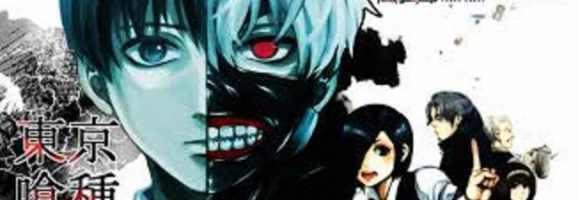
As one of a couple of “psychological” genre anime of the summer 2014 lineup, Tokyo Ghoul (2014) had a lot of us holding our breaths. It’s definitely in need of a sequel… because as it stands, the series is an incomplete piece of work that indulges in unnecessary gore with almost nothing going for it other than as a setup for another season.
Story
Tokyo Ghoul takes place in a universe in which Tokyo is infested with beings known as ghouls, humanoid creatures with supernatural powers that feast exclusively on human meat. Our protagonist, Ken Kaneki, gets a date with Rize Kamishiro, an older woman he had been interested in for some time now, unaware that she is a binge eating ghoul that consumes humans for enjoyment rather than sustenance. After luring him into a dark alley at night, she reveals her secret and attempts to devour him, only for the two to be caught in an “accident” at a construction yard. In a hurry, the doctor reveals that Kaneki desperately needs an organ transplant, but the only available donor at hand was the dead ghoul, Rize. After the surgery, Kaneki discovers he is unable to consume normal human food and uncontrollably craves human flesh. During his first fit of insanity, he is discovered by Touka Kirishima, a fellow student at the same school who also happens to be a ghoul. She reintroduces him to a cafe he often frequents, unveiling that the employees are also all ghouls. Tokyo Ghoul covers the struggles of Kaneki as a half ghoul, half human mixed breed and the challenges he faces in keeping his identity a secret.
The premise of the story is not terrible. With proper development, it’s proven to be an enjoyable plot as the manga is fairly successful. The anime produces a similar success. If anything, Tokyo Ghoul does manage to shake viewers by constantly contrasting disaster with everyday peace. One minute, Kaneki and his friends will be laughing at Cafe Anteiku and in the next he’s being tortured, his arms and legs being ripped off.
This change of pace seems to be the one thing that works in the anime’s favor. Being a 13 episode series, there isn’t too much time, necessitating every minute be used to the fullest extent, and with a story like Tokyo Ghoul, this cramming synergizes naturally with the swinging atmosphere. It also serves to shock the viewers to keep them from realizing that a very key factor is missing.
Art, Animation, and Sound
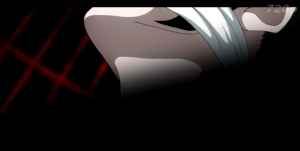
The art is standard and the animation is up to par. There’s nothing distinctly positive or negative about either aspect. The style is appropriate for the series and reflects the nature of the story. The animation is decent; nothing looks sloppy and the actions are mostly fluid and smooth, but the quality isn’t up to the standards of more renown studios such as ufotable, KyoAni, and Bones. The only con is the absolutely unnecessary gore and blood. Gore and blood don’t bother me in particular, but when used in excess for no particular reason, it’s pointless and wearisome. Is it supposed to be the shock factor? There are plenty of ways to surprise an audience without scribbling red. Others propose it’s for realism; after all, if someone’s body is getting pierced hundreds of times with sharp objects, then blood must squirt out. That’s a preposterous reason, if only because it seems mandatory in the series for characters lying on the ground to see blood flowing ten meters away from a body. Some parts are disturbing enough to merit blanket censoring; Studio Pierrot often resorts to covering any excessively violent scenes with a blackness. If anything, the amount of gore seems to be an excuse to cut productions costs. In any case, though blood is definitely a strong tool in the horror/suspense drama, there are times in the anime when the use of blood seems unjustifiably extravagant.
The soundtrack for Tokyo Ghoul is appropriate. There are rarely any lasting, happy scenes in the series, and the OST reflects that accurately. Yutaka Yamada composed a more than decent album that has tracks that cover a wide variety of nonpositive emotions; there are specific tracks that convey suspense, anxiety, horror, fear, and everything in between. Being a type of anime that relies heavily on music to set the mood, Yutaka Yamada has risen to the occasion, especially considering that this is his first professional work on an anime. The decency in the sound department goes beyond simply the music. The cast of voice actors and actresses is simply remarkable, with many that some from influential and popular series. Kana Hanazawa, Mamoru Miyano, and Katsuyuki Konishi are some of the more recognizable, having been involved in works such as Tengen Toppan Gurren Lagann (2007) and Steins;Gate (2011). These prolific performers are relegated to side roles, but a very talented Natsuki Hanae performs the main role as Kaneki well.
So far, the sound, art, animation, and story have all received passing marks. What exactly brings Tokyo Ghoul as a “sales bin worthy” series?
Characters
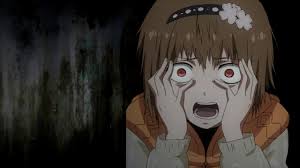
If I had a choice, I would name each character, point out personality traits, and move on to the next section, because there is absolutely no meaningful character development that occurs in Tokyo Ghoul. There are certainly attempts, but they fail to impact the audience or are completely irrelevant and nonsensical. The entire arc concerning Hinami Fueguchi preeminently exemplifies this complete lack of care for character development. Hinami Fueguchi and her mother moved into Cafe Anteiku after a troublesome client shows up at her father’s clinic. At first, she’s quite distant from everyone at Anteiku but slowly warms up to Kaneki and Touka, viewing them as older siblings. One day, while Hinami and her mother were out shopping, they are discovered by “Doves”, investigators specializing in hunting down ghouls, and her mother sacrifices herself to save Hinami. Many things happen, and by the end, Hinami, parentless and alone except for her friends at Anteiku, decides to live in place of her parents. Everything would be absolutely fine and made a great story, but is entirely ruined by the fact that despite all her hardships and the strain on Kaneki and the rest of Anteiku, Hinami remains virtually the same person. The audience doesn’t learn more about her nor does she exhibit any kind of thoughts or actions that differentiate her from her previous self. Not that it would have mattered if she did somehow change. Unfortunately, poor Hinami is absolutely no significance for the rest of the season. She rarely gets screen time and may as well not exist having considering how much she enters her companions thoughts. Not having read the manga myself, the author’s true intentions for Hinami are unknown to me. However, it’s sloppy and wasteful for a studio to air an arc with a support character as the focus but completely ignore that character outside of the arc.
Some might argue that the arc did act as the catalyst for something, namely Kaneki’s goal of accepting his position as the only(?) half ghoul to bring both sides to an understanding. This is great. It’s a meaningful change to Kaneki’s character and also has the potential to drive the plot forward. But by the end, it’s irrelevant. Kaneki unable to act on his ambitions and his intentions of acting as a mediator between two hostile species. Worse yet, the idea isn’t even brought up again in a meaningful manner until the very end, and even this reference was indirect and off-topic. In the last episode, Kaneki is being tortured continuously and comes to the realization that the same could happen to his loved ones. When he discerns that the cause is his own weak, selfless nature, he rejects his past way of living and becomes sadistic and brutal, or so the show would like us to think.
Another Season?
The way the series ended almost explicitly unveils the making of a sequel, which has been confirmed for January of 2015. The complete lack of screentime for supporting characters, a vague ending, and the character dialogue all pointed a high likelihood of an upcoming season two, and the anime desperately needed one. Why should a underwhelming anime get a sequel? Because of the incompleteness of the characters and how the first season is the ultimate set up a stellar second season.
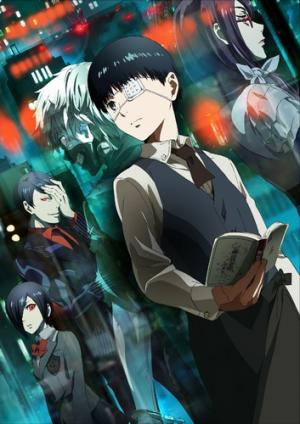
Let’s go back to Kaneki. I mentioned that this show needed a sequel, and he is the reason. The audience is left hanging. We don’t know how Kaneki has changed. Is his new personality permanent or a temporary lapse into an angry persona? How does he view the role of mediator now?Does he even think about it? How will he act in the future? We don’t know, and therefore, there’s no meaningful development. There’s a lot of potential, but with nothing to tap into it, Tokyo Ghoul is disappointing and a waste of time. But a second season would be able to answer those questions and more. A second season would complete the current bland state of the anime by fleshing out exactly what Kaneki does with the answer he’s struggled to find.
A season two could instigate a domino effect, with all characters linked to Kaneki being developed alongside him. Touka also seems to be unchanged, but after her companions revelation, will she continue to stay the same? The change from being timid and weak to bold and strong seems to big of a swap to ignore, and many other characters must respond. This first season could have been an extremely long prologue and nothing more. If that turns out to be the case, expect great things from Tokyo Ghoul‘s return. All this only applies, however, if the second season manages to answer all of these questions.
In the end, Tokyo Ghoul is a decently drawn anime that’s based on an interesting premise, but it’s execution was lacking; it’s a house with a foundation but no walls. With static characters that have unmoving personalities, it’s not worth a watch unless you enjoy excessive gore. But just as Clannad: Afterstory depends on the first season to set it up, there is the chance that the entire Tokyo Ghoul series could become a masterpiece. The first season could be the first step on the stairway to a masterpiece. However, until a second season is completed, Tokyo Ghoul is a disappointment and nothing more.
Rating:
What do you think? Leave a comment.




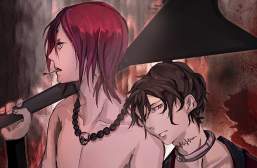
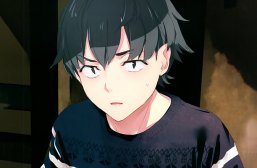
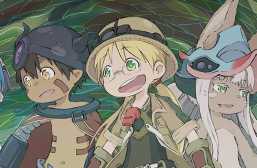
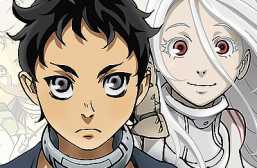
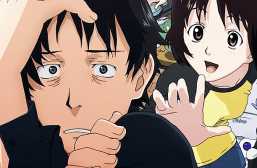
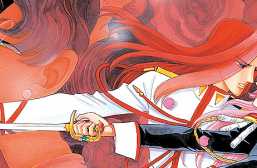
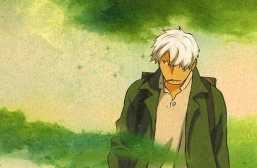
The opening sequence was very slick.
I was a little underwhelmed with the overall premise. It didn’t yet have that X-factor point of difference to set it apart from similar works. So I can’t say I’m really impressed here.
This series sounds amazing.
Although the fact that it just… ends, and nowhere at that… I don’t know. I’m really not willing to watch a show that doesn’t have any conclusion.
it’s getting a second season and the manga is getting a sequel
While I enjoyed the first episode of the series (and saw its potential), the ridiculous amount of censoring really turned me off… I’ll pick it up again when I can get an uncensored version.
TG definitely has flaws in the ending. It’s not just another case of “They gotta make a second season.” The fact is, if they don’t make another season, the show will not be complete from a viewer’s standpoint. It’s as if someone brought out a huge dish of meat and potatoes, but you were only allowed to eat the potatoes and a bite of the meat. At the end of the day you got to eat, but you’re left just staring at the best part.
When mentioning the sound (or music), I think it’s definitely worth pointing out the OP and ED are simply ingenious. The overall soundtrack, as you have pointed out, is so-so, but just because of the OP and ED, likely the best of this season, I’ll give it a higher score on the music department.
As it clearly aims to have a second season I’m actually pretty satisfied with how it ends. I’ve been bored for some episodes but the last one really got on me. Rise-san and Hanazawa’s voice acting just stole the whole show.
Tokyo Ghoul was just okay for me. Great fight sequences, interesting concept, lame ending, weird pacing, animation got a little questionable too.
I lost interest after the an episode I watched, because half of the whole fight scene is blackened. They were fighting in the dark area and I can’t f’cking see what’s happening in some of the parts. I heard this show will be very gory, but the censorship is as bad as Deadman Wonderland. Maybe a bit worse. I don’t mind them covering up sexual materials or nudity, but blur out, whiten, or blacken gory spots in some good fight scenes simply lessen the intensity and atmosphere. Two episodes ago, I NEARLY lost interest because of the censorship in the church fight scene.
I’m sorry, Japan, it’s too much. Should’ve been OVA or put the series in premium channels, which I heard doesn’t allow censorship.
Once i learned that shuhei Morita was directing, i had almost no doubts whatsoever that this series might end up being a keeper.
I’m not usually a big fan of the horror genre in general, and much less so when it comes to anime. There is something about things being animated that gets rid of what little fear I feel watching monsters attack people.
There have been exceptions though like Shiki for example, and the story along with how highly regarded the source material is made me check it out, and I’m glad I did (so far anyway).
It seems like a really interesting take on a pretty standard premise, but the animation was outstnading and I found myself drawn in much faster than with the other premieres.
I didn’t have any interest in Argevollen until the final minutes, and even then I’m still not sure if it’s just setting up the background or if it’s just going to be typical and boring.
I like how Tokyo Ghoul just threw you right into the serious stuff off the bat, and even when it was introducing the MC it still had an ominous feel that they didn’t wait too long to follow through on. I’m hoping this becomes the series that surprises me most, and it’s off to a good start.
The show was good but I can’t say it was excellent.
Fascinating review. I will download this tonight, what else am I going to do with my life!
The manga just ended terribly with no conclusions but more questions.
Yea it is kind of funny and sad that both the anime and manga have endings that leave a bunch of stuff in the air.
I think the story is resolved in a very accelerated way.
this anime looks really good as expected because it really getting into the creepy atmosphere and everything. however from the beginning it seems pretty clear what will happen…
At first, I didn’t know what to expect from this show since I’ve never even heard about Tokyo Ghoul before, but the first episode definitely convinced me to keep watching it.
I think it has sort of similarities to Kiseijuu/Parasyte that did pick my curiosity.
Yeah, the show really needs a second season to work, otherwise it just feels like the story dropped off the face of the Earth. If I’m correct, this is Shuhei Morita’s first time being the main director of a TV series, and it is probably my least favorite of his works. It’s not bad and it definitely has some really good moments, but it is underwhelming as a whole.
I actually do like the final episode, though specifically for Morita’s visual direction. The mental conversation between Kaneki and Rize was captivating, particularly with the visual of white flowers being stained by blood and transforming.
In the end, it is by no means a bad show, but it is hardly a great one either.
I just started reading the manga, and it’s pretty good so far.
It was pretty solid, though it didn’t grab me completely. I had very high expectations though.
I actually really liked the ending, though it was somewhat unsatisfying in it didn’t do much in the way of resolving all storylines.
Good anime, mediocre adaption though.
I really enjoyed everything about the season finale of Tokyo Ghoul except the actual ending.
The anime, in my opinion, was executed much better than the actual manga, but the ending was WAY too rushed. The transformation of Kaneki’s character was so beautifully done, but then we see all of that condensed into a fight sequence that was condensed into five minutes when it really should have been at least fifteen to twenty minutes. Another episode could have made me a little bit happier.
That’s not even a cliffhanger. It was kinda like “OH MAN, we have to end this NOW!”, and then poof! Season Finale
I just started this and wow. The first couple of episodes, gory as I wanted. I’ve stopped for a bit because of work loading up. But, I’ll get back. Thanks for motivating me!
The ending of the cartoon version is kind of disappointing. I do believe the animation should have a sequel, so as the cartoon.
I started reading the manga, and I really do enjoy it. I watched the first episode and loved the series even more. I need to sit down and finish it.
I thought the last episode was the best part of the whole thing, honestly. Tokyo Ghoul is all about the ongoing cycle of violence: humans fear being eaten alive, ghouls fear being persecuted or killed, and so they continue to murder each other to stay alive. As one who is half-human and half-ghoul, at first Kaneki appears to represent the chance of reconciling both halves and saving hundreds of lives. Just look at the sacrificial imagery in episode 8–could Kaneki be the one to take on the prejudice and hatred of both ghouls and humans and ensure a more peaceful world for both?
The genius of the last episode of Tokyo Ghoul is it proves the (very rushed) shounen tournament plot proceeding it wholly irrelevant. The central drama of the series isn’t the Battle Between Humans and Ghouls, but the Temptation of Kaneki, pushing him beyond human endurance to see whether he remains true to his principles or whether he becomes a monster. And in the end, he snaps, ground up in the system just as everyone was before him and spat out as something far more dangerous than he once was. It’s a nihilistic ending on the same level as Berserk’s infamous last episode; the only note of hope here is Kaneki pledges to evolve past his ghoul half and become “stronger,” though whether that means being more empathetic or a better and stronger killing machine is difficult to say. Tokyo Ghoul is being given a second season in the fall, but I think director Shuhei Morita (who was nominated for an Academy Award for best short a year ago) said everything he wanted to say with Tokyo Ghoul’s finale.
Tokyo Ghoul was one of the most exciting animes, for me, since the inception of Bleach. Having not read the manga (a lot of people who had read the manga were dissatisfied with how the anima portrayed the story) I found the anime to be delightfully interesting, especially as a lover of anything containing gore. However, the completely overdone censorship was definitely one of the negatives that this anime had. The ending was obviously setting it up for the second season, which will be coming in January. I can only hope that there is an increased focus directed towards character development in the second season, because many of the characters introduced later in the first season were not fully dwelled into.
I think I was able to really enjoy this series because where I watched it from had most of the episodes with no censoring at all
Haha! I think that ending was left purposefully as a cliffhanger to get the watchers to come back to the series for Tokyo Ghoul Root A. As for the whole plot for the series, I had the same frustrations as you did when I watched the series. Loveable characters dying without a purpose, Kaneki staying as a stagnant and ignorant boy, etc. But after watching the first episode of the second season, it’s clear that the first season was a setup. I think the animators drew out the series and continuously added new characters so that we can walk with Kaneki and see what he has seen (and probably feel his frustrations as well). Although I thought the last episode was the best part of season 1. After seeing Kaneki floundering around, it was a great feeling to see him doing the damage for once.
To the say the least I did no enjoy this show at all. I only watched the first season and was completely floored by the ineptitude of the governmental forces within the show which simply pulled me straight out of the experience. The argument that it was more grey morality than black and white was hamfisted and beaten over the viewer’s head. I honestly see no reason why anyone would ever think the ghouls are not the ‘bad guys’ and the police and general population are the ‘good guys’.
For a comparison we’ll look at the series Parasyte which has a similar premise to Tokyo Ghoul and I would argue that Tokyo Ghoul drew some inspiration from it but missed a major part, humanity is fighting to survive against beings who want to kill them and only exist to gorge themselves on the flesh of mankind. Early in the series they outright say that the populace has known of ghouls for a long time yet, uncharacteristically for mankind, they just allow the superhuman cannibals to continue living. Simply put, it does not make any sense at all why humanity acts the way it does in the setting. In Parasyte, when the public knew about the parasytes they also told the populace how to find someone they suspected as a parasyte, a simple slightly painful greeting of pulling the others hair. If the hair started to wiggle on its own then the person was a parasyte. In Tokyo Ghoul it is said rather early on that conventional bladed implements will not pierce a ghoul’s now armoured flesh. So why is it that people don’t carry around something akin to a lancet then, if the person bleeds then they are human, if not they are a ghoul.
Returning to the topic of governmental ineptitude I point again to Parasyte for what would probably happen. As soon as the government realizes some kind of super powered mutant is shown to exist and they have a mostly accurate way to prove that someone is a ghoul or not they quickly determine what they can use to best dispatch this threat and begin to kick in doors. There would likely be civilian casualties, as shown in the show and unlike Tokyo Ghoul for the most part where any open conflict occurred in empty underpasses and warehouses, but those casualties in the discussed police sweeps are the fault of the victim. Then again, if the heavily armoured SWAT team is telling you that there are crazed killer alien mutants in the building and you either get on the floor to be cleared or they’ll assume you’re one of them then it isn’t a hard choice.
I know it’s a show about super powered people fighting super powered people but they seem to have the rest of the world set up as just a normal world when the existance of Ghouls would drastically change the tone and dynamics of the government and would see that cascade down throughout the whole setting. This isn’t even starting to go into how they would effect world politics especially concerning how two of the larger members of the UN Security Council are already within preemptive strike distance of Japan.
Overall, the show was somewhere between ‘bad’ and ‘meh’ for me. I’ve read and seen much better attempts at a world where there is a group that is capable of causing destruction on such a massive scale per single person. I’ve also seen shows where grey is properly done, which is to say where one faction doesn’t need the total destruction of the other to exist.
I actually quite liked Tokyo Ghoul. The soundtrack was a good fit and it really represented the overall mood of the anime. However, you do have a point, because a lot of times animes don’t do a lot of justice to their manga counterparts. Fourteen volumes were pressed into a 12 episode long anime. A lot of information that is critical to the manga is sometimes left out as well. Also, it gives them less space for world building. We also know that animes sometimes have a tendency to deviate from the plot (*ahem* Kaneki joining Aogiri AND WORST OF ALL, HIDE!!!!!!!! *oshiete (╯°□°)╯︵ ┻━┻*).
I do agree with you on the point that you made about the characters. However, I still think that this is another instance of an anime not properly representing its manga. To me the character development overall is mostly slow paced, which is pretty realistic because in real life, unless we go through some major experience (like Kaneki and Jason), then our character doesn’t usually change drastically. For instance, I honestly wasn’t a fan of Touka in the beginning, but as the show progressed, we saw her view of Kaneki change. We realise that a lot of the characters have changed as well, though it was in the past. All of the Anteiku staff weren’t as warm and friendly as they are now, and we have to remember that each person copes differently. I do agree with your point on Hinami, but in an anime that wants to focus on Kaneki and not be long winded (like this comment, seriously, why am I still typing?), exploring Hinami’s psyche probably would have been difficult to balance with Kaneki’s delicate frame of mind. We can also take into account that Hinami is a ghoul and what happened to her is nothing out of the norm for her kind. She lives in that type of world, and we already saw that her case isn’t unique because we all know what happened to Touka’s parents (mostly her father) and Nishio’s sister and Yoshimura’s lover and Kanae’s family and honestly, I can go on and on but this comment is turning into an essay and I really need to stop typing o.o.
Anyway, I honestly love Tokyo Ghoul, and I’m now reading :RE and patiently,(though I’m nervous as hell because this is Ishida we’re talking about and look what happened to Seidou!!!) waiting for Hide’s face that’ll definitely show up any chapter now.
Any chapter now…
(╥_╥)
This gives a couple of vibes similar to the Twilight franchise.